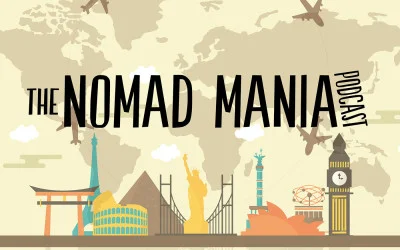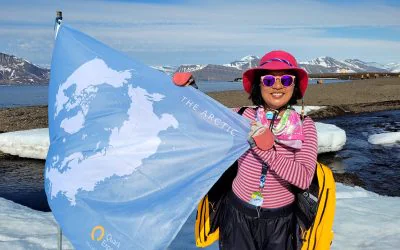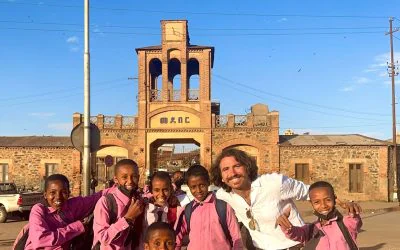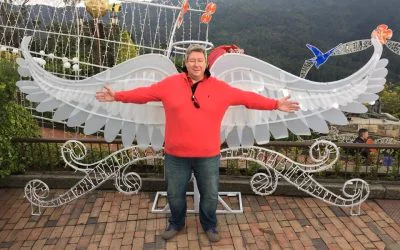
Tudor in Bolivia
Tudor, tell us about your early years and how your interest in travel developed.
When I was a kid all 4 walls of my room were covered in National Geographic maps. I used to trace around the countries and cities with my finger and wonder what was going on in that place right then. In my 20s I travelled 3-4 times a year to Europe, USA, and Asia for business but always the same cities. In my early 30s I started branching out and going to all the big events in the USA such as the Kentucky Derby, Indy 500, Burning Man, World BBQ Champs etc.. It was in late 2011 that I noticed friends on facebook visiting ‘unusual’ places and it got me thinking. I had somewhat of an epiphany and realized I could actually visit every country in the world so bought a backpack and decided to start exploring. All but 8 of the 193 were visited in the past 6 years.
You just finished 193! How do you feel? Is it the feeling your expected?
It certainly was a mission! That said it did feel muted so not what I expected. Part of it was a reflection on the amazing people I have met who have the same aspirations as me but through circumstances totally outside their control could never actually do it. Nonetheless those very same people were some of the first to congratulate me. Another part was the acceptance that it is a journey not a number. There is always more to see and do. I would feel more comfortable saying ‘every country’ after the FIFA or ISO list.
You left Angola last. Any reason for this choice? How was your time in Angola?
Due to the visa complexity I had been putting it off. As a result of the recent election the Visa policy was relaxed right when I needed it. The London Embassy was great to deal with, the paperwork was straightforward, and the Visa was delivered on time as promised. I had some local friends drive me around the sights and give me a history lesson. The Mausoleum for President Neto was the highlight. I visit every museum I can to learn history and see how people tell their story. It seemed the National Museum was being renovated which is great. The Military and Slave Museums could have had a lot of more detail for such a rich history.

Turkmenistan
Of all the places you visited, which ones surprised you most in a positive way? And why?
Sudan for having a superb little gem of a museum in Omdurman with original artefacts from the war and British occupation. Comoros, which I had only heard bad things about, for having the clearest water I have ever seen (I was there for underwater photography so thrilled) and smelling like Chanel No.5. It is also a geo political historians dream for it’s relationship with France, Mayotte, and coups.
On a more general note all I was amazed at how forgiving people in colonized countries were. It was only a generation ago we (I say that as a white guy) were stealing their stuff, shooting the ones who wanted independence (or after like Patrice Lumumba), and sending them off to be cannon fodder in our stupid wars. In spite of having every right to tell me I should ‘go back to where I came from’ or the like, no one did. Basically everyone in the world wants a roof over their head, food on the table, and their kid in school. Political talk is cheap.
And were they any you feel more negative towards?
I was incredibly lucky and had a clear run of great experiences. Apart from one attempted razorblade pickpocketing, one verbal street altercation over photography, and being arrested in Central African Republic, it was all positive. The more negative view is against the actions of the West/Soviets during the cold war basically destroying every institution in developing countries and directly contributing to or participating in the murder, torture, starvation and economic devastation that few have recovered from. You see that in the museums and in the streets. I would say that for a majority of people living in Africa it is the historic event with the greatest impact on their day to day lives. It would be for central America too if not for the War on Drugs.
The saddest part is how little we (the West) learned from all this. The exploitation and political interference continues. It is easy to work this out when you have walked around every country and can see who has troops stationed there. I don’t think a lot is achieved from endless apologies or self flagellation about historic abuses but at the least people should be aware of them and how they contribute to the current dysfunction in many places.
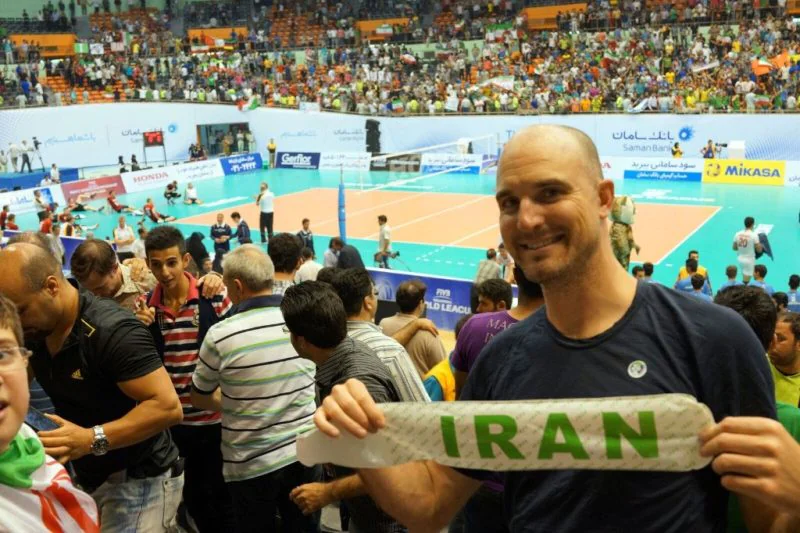
Self-explanatory!
Your travels have had a more social or charity aim. Tell us a little about this side of travel for you, and what the challenges and rewards of sending out your message have been.
I wanted to share my travels in a way that would answer some of the questions I had about the world as a kid. I created touchableearth.org as the first app where kids teach kids about the world. It’s a really simple concept of having a kid in each place teach about one aspect of their lives e.g. play, culture, family, school. All up I’ve shot 1000 videos in 18 countries. The program is free to use on the site in English and French.
It quickly morphed in a wider aim of promoting tolerance in gender, culture, and identity. I say it in that order for a reason. The single biggest problem in the world is gender inequality and I don’t think we have a hope of addressing violence based on culture and identity until we solve that first. An equal number of videos are presented by girls as boys validating them as contributors to a dialogue. This is in stark contrast to virtually all educational materials I have seen globally.
The program won an award from the UN as the best app to promote intercultural dialogue and resulted in speaking engagements around the world.
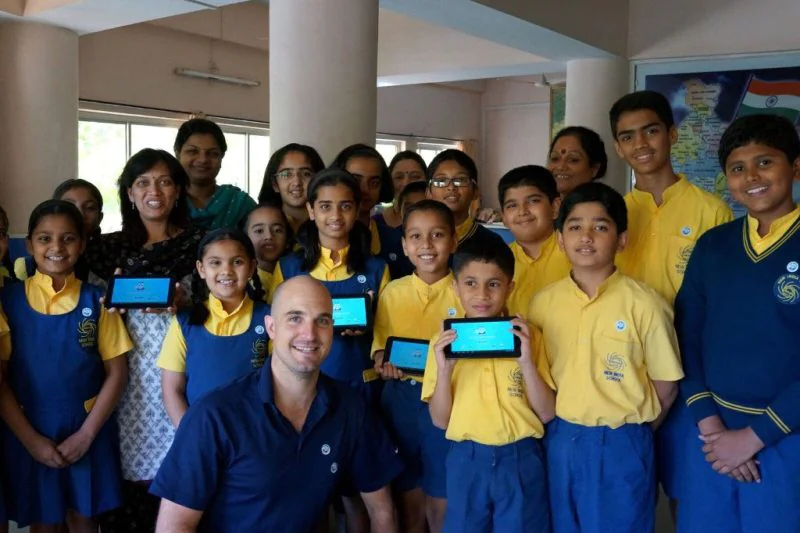
With schoolchildren in India
So, based on this, what were some of the most memorable moments from your travels?
A. A simple experience. My night in Tiebele, Burkina Faso, stands out as the first time I stayed in a village. I had a local guy, Arnoud, taking care of things. When I arrived he set me up to sleep on the roof of his brothers mud brick hut. I asked him where the toilet was and he made a grand gesture over the adjoining paddock and said ‘toilet naturale’. That evening I had a bucket and cup shower under the stars (there was no electricity there). Arnoud’s Great Grandmother, Grandmother, Mother, Wife, and baby daughter sat a few meters away on the other side of a divider preparing dinner in pitch black while talking and laughing. Later that night I asked Arnoud, who said he was a DJ, if there was a party on. It was a Sunday and there wasn’t. We went to the club anyway and he brought out some beers. I asked what else he had – to which he replied Rum by the bottle. I was a little budget conscious as the last place I had spirits in a bottle was Las Vegas and it was $800. Turns out table service in Tiebele is only $5. He rallied up some friends and we partied all night. In spite of my terrible French and his limited English we had a great time and are still in touch.
B. I’ve been fortunate to visit stunning places when no one else was there. I’ve sat alone in El Jam, had Angel Falls to myself, Meroe, Virunga, Socotra, Djenne, the list goes on. When I visited Athens and was almost bludgeoned to death by all the selfie sticks (with ipads!) flying around my head I was initially scornful of the throngs of tourists. However I think all of us (nomadmania types) need to appreciate that for many people having a photo in Parthenon may be the trip of a lifetime due to their personal circumstances. Having an entire UNESCO site or Natural Wonder of the World to oneself is an extraordinary privilege.

Underwater in Palau
You are a lawyer from New Zealand. Has this – your profession or nationality – in any way shaped your view of the world? And how do people react when you tell them where you’re from?
Ex German Chancellor Willy Brandt once quipped about Kiwis “idealism increases in direct proportion to your distance from the problem” New Zealand’s isolation is a blessing and a curse in terms of shaping a world view. On one hand it grants a sense of objectivity when looking at global problems and solutions. On the other it can allow a naivety about the complexity of them when you haven’t grown up in a particularly historical place.
I tend to get a good reaction when I say I am from New Zealand. The three main things people say they know about it is beautiful, sheep, and All Blacks. The only let down is when they say ‘oh, it is by Australia’. It was particularly humbling in Nepal where they got incredibly excited. Most people know that kiwi Sir Edmund Hilary was the first (equal) guy to climb Mt Everest. What isn’t so well publicized is the immense amount of social work he put into Nepal to improve the rights of Sherpas and protect the local environment from climbers. He is revered there for it and it astonished me that simply having the same nationality conferred some benefit.
As for being a lawyer. The best reaction I received was crossing Guinea to Sierra Leone. The man writing the ledger asked what I did. I said I was a lawyer. He stopped writing, jumped up and exclaimed ‘that’s amazing! Congratulations!’ and started shaking my hand.
So what are some of your future plans, both in terms of travel and in terms of the development of your social projects?
My focus next year is Touchable Earth and having more children benefitting from the program. There is plenty of content available for it so the priority is increasing usage rather than shooting more videos. I’ve funded it to date but as it grows I need a formal non profit structure in place.
There are new partnerships to roll the program out through refugee camps in Africa and the Middle East which may influence travel plans. I also have a few speeches lining up in the US mid year and would try build something around those.
In terms of new places I am working off the FIFA and ISO lists. Luckily a lot of them are islands so I can include some underwater photography. For already visited countries (but not places) – I am looking at Agadez, Baghdad, and Timbuktu to hunt for treasure.
Finally the question we always ask – if you could invite four people to dinner from any time in human history, who would you invite and why?
Whomever was in charge of the Conquistadors to ask him to not burn all the books (and people) of the Mayans/Aztecs/Incas.
Aristotle to congratulate him on being central to every course on philosophy then to school him on how much better the world would be if he wasn’t a misogynist. Everyone is still paying for that.
Al Biruni, a Persian Scholar from 1100ish who was simultaneously the greatest mathematician, philosopher, astronomer in the world, but also one of the first people to travel to another country to learn about people rather than pillage it. He spent 10 years walking around India learning languages and customs. His 900 year old book is at Amazon.com (“On India”).
My paternal Grandad who I never met. He was a coal miner at age 12 in Wales and basically dedicated his life, including getting shot up by the Nazi’s, to ensuring my dad didn’t end up the same way. I’m sure he would be chuffed to know I took the opportunity afforded to me through that dedication to visit every country in the world and try make someone positive from it.
The photos in this interview are from Tudor’s personal collection and we thank him for sharing them with us at NomadMania!




